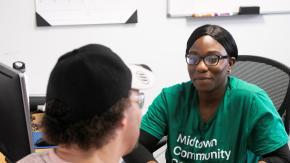
Many people with mental health challenges wind up in the criminal legal system because they have virtually nowhere else to go. Take a look inside the special court program in Manhattan working to change that.
For people with serious mental illness, jail and prison are often the last in a long list of systems that have failed to address their needs. Struggling to access stable care, housing, and jobs, many people with mental health challenges wind up in the legal system because they have virtually nowhere else to go.
That’s what makes investing in early intervention mental health support a crucial social justice issue—and an investment in public safety.
Mental health courts are designed to do just that. Their goal is to treat an arrest as an opportunity to put people struggling with complex mental health challenges on track to receive the support they need. Many long-standing courts of this kind—like the Brooklyn Mental Health Court, which has served as a model for the community for over 20 years—offer this vital service to people who would otherwise face incarceration, helping to avoid the harms and trauma that come with jail and prison. But there’s also a need for courts that offer people meaningful pathways out of the legal system, and into community-based care, before they are facing serious charges that could land them in prison.
A special court program in Manhattan aims to meet that need for people with serious mental illness accused of low-level offenses—a population that often slips through the cracks. The Misdemeanor Mental Health Court we help run in partnership with the New York State Court System addresses the underlying challenges that bring people into the legal system while offering a pathway out of it. After their case is referred to the mental health court from a conventional criminal court downtown, participants usually attend a same-day assessment with licensed social workers in the same building to map out their unique care needs. The program’s approach to care is holistic—it might look like therapy sessions, help accessing housing or benefits support, connections to health care, or harm reduction training. It’s tailored to the needs of each person, recognizing that mental health support isn’t one-size-fits-all.
Participation in the program is entirely voluntary, and there are no penalties for those who opt out. People who choose not to engage in the program, or who don’t complete it, are referred back to the conventional criminal court, where their case is processed as usual.
Each week, the clinical and legal teams at our Midtown Community Justice Center check in about participants’ progress, what’s working for them, and where they might need adjustments. This is another unique aspect of the model: these regular interactions mean that cases are resolved much faster—within weeks, rather than the months it takes in more traditional courts. “We don’t leave people hanging,” said Melanie Hodor, a senior social worker with our Midtown team, in a recent article. “We’re constantly engaging them at a very fast pace which allows us to build rapport very quickly.” Community navigators—trustworthy mentors with lived experience of the system—may also guide participants throughout the process, keeping in touch with them between appointments and helping them overcome obstacles along the way.
One person who completed the program, Max, is a 35-year-old Black man who grew up in foster care and has spent the last three years living in the city’s shelter system. When his case was referred to the Misdemeanor Mental Health Court, he reported struggling with bipolar disorder, depression, and PTSD. With support from our team—whom he touched with his kindness and his story—Max had the opportunity to work towards his personal goals: applying for membership at Fountain House, seeking work with the city’s Parks and Recreation department, and securing a voucher for rental assistance.
Central to the mental health court is the concept of procedural justice, which ensures that fairness and dignity are upheld not just in the outcome of each individual’s case, but in the legal process itself. Special care is taken with each person to explain every part of the process, and to reiterate that they have agency over their participation. “We really rely on the agency of participants,” presiding Judge John Zhuo Wang shared. “Research has shown that people who own their own decisions are much more likely to adhere to them both short-term and long-term.” Each person is encouraged to ask questions, and most importantly, get the answers they’re looking for.
The unique support, transparency, and respect the court embodies means that people are more likely to follow through with the services offered to them. The vast majority of people who participate in the program see it through to completion: participants graduated from the program in 85 out of the 89 cases seen in the court’s first year. Those who complete the program not only potentially have their charges dismissed, but also enjoy a graduation ceremony where the court team, including Judge Wang, celebrates their accomplishments. “I know court isn’t somewhere most people want to be any longer than they have to,” Judge Wang said to one graduate after announcing that her charges had been dismissed. “But it was such a pleasure to have you here. You have so much positivity surrounding you.”
The court keeps its doors open to people even after they have finished their mandated programming, and the relationships that participants build with their social workers often last well beyond their graduation date. “This isn’t just a court,” Judge Wang noted at the end of the graduation ceremony. “You’re welcome to come back here anytime you need.”

